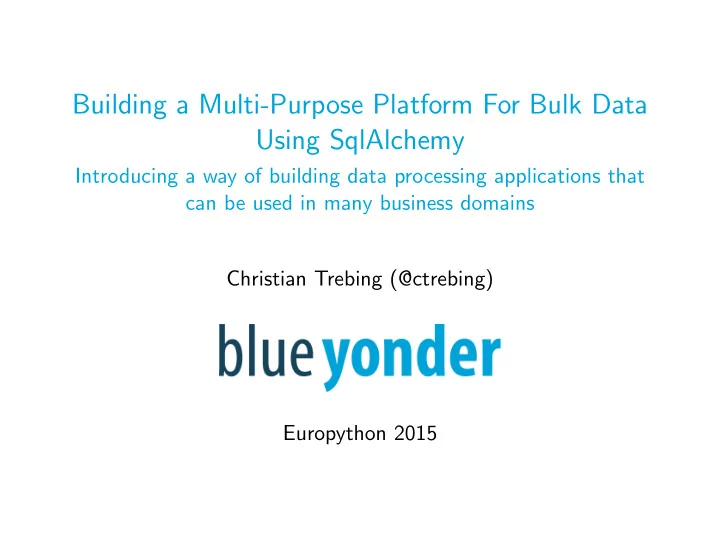

Building a Multi-Purpose Platform For Bulk Data Using SqlAlchemy Introducing a way of building data processing applications that can be used in many business domains Christian Trebing (@ctrebing) Europython 2015
SQLAlchemy From SQLAlchemy website: SQLAlchemy is the Python SQL toolkit and Object Relational Mapper that gives application developers the full power and flexibility of SQL. SQL databases behave less like object collections the more size and performance start to matter; object collections behave less like tables and rows the more abstraction starts to matter. SQLAlchemy aims to accommodate both of these principles.
Let’s Build... a Multi Domain Platform Business Requirements ◮ Load bulk data via csv ◮ Verify/clean data ◮ Make clean data available to machine learning ◮ Different business domains: Retail, Tourism, ...
Let’s Build... a Multi Domain Platform Technical Todos ◮ Create database schema ◮ Parse csv, save parsed csv to database ◮ Validate data ◮ Check required fields ◮ Check references between data records ◮ ... ◮ Give feedback to customer about processing status ◮ Separate clean, validated data from raw input
First Customer: A Pub source: wikimedia commons
Data Model for Pub
A CSV Delivery --Drinks-- ExternalCode,Description,Alcohol BEER, Beer, 4.9 WHISKY, Whisky, 40 COKE, Coca Cola, --Orders-- ExternalCode,Drinks, Count 2015-07-10, BEER, 10 2015-07-10, COKE, 8 2015-07-11, BEER, 15 2015-07-11, WHISKY, 2 2015-07-12, BEER, 13 2015-07-12, WHISKEY,1
One Task: Find References Between Objects
How To Implement Reference Finding? Core / ORM SQL: 1 UPDATE ST_ORDERS SET DRINKS_REF =( SELECT ID FROM DRINKS 2 WHERE EXTERNALCODE =ST_ORDERS.DRINKS); 3 Core: 1 stmt = orders_stage .update ().values( drinks_ref =( select ([ drinks_core .c.id]) .\\ 2 where( drinks_core .c. externalcode ==\\ 3 orders_stage .c.drinks))) 4 ORM: 1 for order in session.query( Orders_stage ).all (): id = session.query( Drinks_core .id).\\ 2 filter( Drinks_core . externalcode ==\\ 3 order.drinks).one () 4 order.drinks_ref = id 5
Next Customer: A Brewery source: wikimedia commons
Domain Model: The Lingo Package
Task Specific Model Renderers
Code Sample: Domain for Pub 1 from lingo import Domain , Category , elements as e 2 class Pub(Domain): def __init__(self): 3 super(Pub , self).__init__ () 4 drinks = Category( 5 ’Drinks ’, 6 e. ExternalCode (), 7 e. Description (), 8 e.Numeric(’Alcohol ’, 3, 2), 9 e.String(’Handling ’, 200) 10 ) 11 12 visitors = Category( 13 ’Visitors ’, 14 e. ExternalCode (), 15 e.Numeric(’Count ’, 6, 0) 16 ) 17 18 orders = Category( 19 ’Orders ’, 20 e. ExternalCode (), 21 e.Reference(drinks), 22 e.Numeric(’Count ’, 6, 0) 23 ) 24
Code Sample: Find References 1 references = [e for e in category.elements if isinstance (e, ReferenceElement )] 2 for element in references : # stage/ core_tables are SqlAlchemy Metadata 3 stage = stage_tables [element.category. stage_name ] 4 ref_core = core_tables [ 5 element. ref_category .core_name] 6 update_dict = { 7 stage.c[element. db_name_ref ]: \\ 8 (select ([ ref_core.c.ID]).where( 9 ref_core.c. EXTERNALCODE == \\ 10 stage.c[element.db_name] 11 )) 12 } 13 statement = stage.update ().values( update_dict ) 14 print str(statement) 15 self.engine.execute(statement) 16
Code Sample: Domain for Brewery 1 from lingo import Domain , Category , elements as e 2 class Brewery(Domain): def __init__(self): 3 super(Brewery , self).__init__ () 4 machines = Category( 5 ’Machines ’, 6 e. ExternalCode (), 7 e. Description () 8 ) 9 sensors = Category( 10 ’Sensors ’, 11 e. ExternalCode (), 12 e. Description (), 13 e.Reference(machines) 14 ) 15 measurements = Category( 16 ’Measurements ’, 17 e. ExternalCode (), 18 e.Numeric(’Value ’, 10, 3), 19 e.Reference(sensors) 20 ) 21
Discussion of Domain Model and Task Specific Renderers ◮ Optimized for high throughput of large amounts of data ◮ Good fit for analytical models ◮ May not fit that well for transactional models ◮ Comparison to SqlAlchemy model ◮ SqlAlchemy model is focused on database description ◮ Domain model can contain more information ◮ for example: time dependent references, value checks ◮ SqlAlchemy model can be generated out of domain model
Applications Of Domain Model
Recommend
More recommend